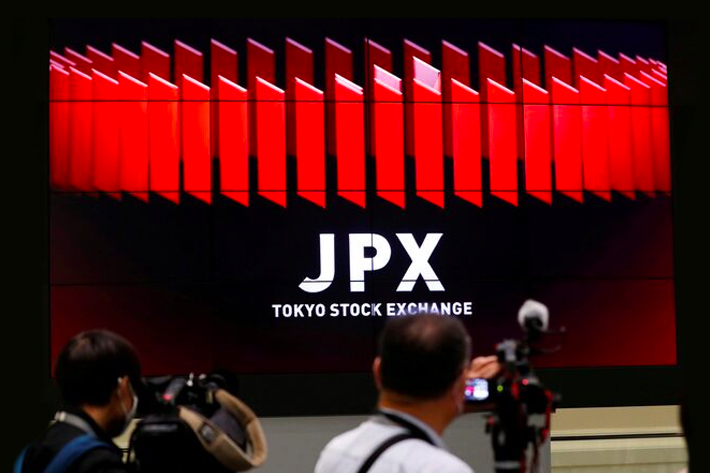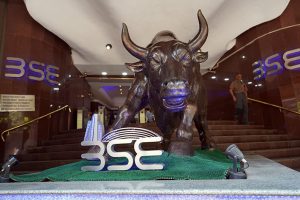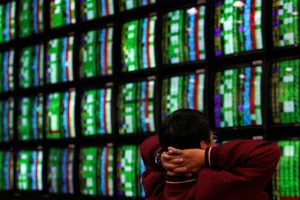Asian stocks rallied on Thursday with investor mood positive ahead of the release of key US inflation data.
Sentiment was also lifted by bets that Beijing will roll out more stimulus in a bid to recharge its struggling economy.
Souring the mood was Japan’s yen, which was languishing near its weakest in decades though the threat of intervention from Japanese authorities prevented traders from pushing the currency to a new low.
That threat saw Japan’s Nikkei share average fall – a weak yen usually boosts the index – as numerous stocks were also discounted for dividend rights before the fiscal year end.
Also on AF: China Keen For Tech Innovation to Drive Economic Growth
The Nikkei ended down 1.46% at 40,168.07, with 202 of its 225 components falling versus just 23 that rose. The index is, however, still set for a 20% jump in the January-March quarter. The broader Topix slid 1.73% to 2,750.81.
The yen fell to a 34-year low against the dollar on Wednesday, prompting Japan’s three main monetary authorities to hold an emergency meeting.
In a briefing afterwards, top currency diplomat Masato Kanda said he “won’t rule out any steps to respond to disorderly FX moves.” The yen was last traded at 151.46 against the dollar.
China stocks jumped, however, on expectations that Beijing will take more aggressive measures to stimulate the economy, while an official’s speech also helped sentiment.
Top legislator Zhao Leji said on Thursday China’s economy will provide a strong driving force for the world recovery, promising they will reduce the “negatives list” for foreign investors.
China’s blue-chip CSI300 index was up 0.52%, with its financial sector sub-index lower by 0.14%, the consumer staples sector up 0.62%, the real estate index up 0.5% and the healthcare sub-index up 1.02%.
The Shanghai Composite Index rose 0.59%, or 17.52 points, to 3,010.66, while the Shenzhen Composite Index on China’s second exchange was up 1.72%, or 29.36 points, to 1,732.61.
Chinese H-shares listed in Hong Kong rose 2.2% to 5,853.92, while the Hang Seng Index was up 0.91%, or 148.58 points, at 16,541.42.
Elsewhere across the region, in earlier trade, Sydney, Mumbai and Wellington rose, while Singapore, Seoul, Bangkok, Taipei and Jakarta fell. MSCI’s broadest index of Asia-Pacific shares outside Japan was up 0.6%.
US Dollar Rallies
Globally, markets were largely rangebound ahead of Friday’s much-anticipated US core personal consumption expenditures (PCE) price index data, the Federal Reserve’s preferred measure of inflation.
Few markets will be open to assess and respond to the new data, however, given the long Easter weekend in many countries.
S&P 500 futures and Nasdaq futures were trading little changed, while Eurostoxx 50 futures added 0.32%. FTSE futures gained 0.46%.
In currencies, the dollar was on the front foot, helped in part by comments from Fed Governor Christopher Waller, who said late on Wednesday there is no rush to ease interest rates.
While a more than 50% chance of a first Fed cut in June continues to be priced in, traders are placing greater bets for similar moves by the European Central Bank and the Bank of England that same month.
Against the greenback, the euro fell 0.06% to $1.08215, and sterling eased 0.08% to $1.26305. The New Zealand dollar fell to its weakest level in more than four months to $0.5981.
The renewed dollar strength halted a blistering rally in gold that sent it to a record peak last week. The yellow metal last gained 0.1% to $2,196.69 an ounce.
Oil prices edged up, with Brent gaining 39 cents to $86.48 a barrel, while US crude rose 50 cents to $81.85 per barrel.
Key figures
Tokyo – Nikkei 225 < DOWN 1.46% at 40,168.07 (close)
Hong Kong – Hang Seng Index > UP 0.91% at 16,541.42 (close)
Shanghai – Composite > UP 0.59% at 3,010.66 (close)
London – FTSE 100 > UP 0.47% at 7,969.42 (0933 GMT)
New York – Dow > UP 1.22% at 39,760.08 (Wednesday close)
- Reuters with additional editing by Sean O’Meara
Read more:
Investors Suspect Beijing Behind Controlled Yuan Decline
Shimao Bondholders Group to Vote Against Debt Revamp Plan
Alibaba Ditches Cainiao IPO, Offers to Buy Remaining Shares
Yen’s Record Slide Lifts Nikkei, Hang Seng Falls on China Doubts























